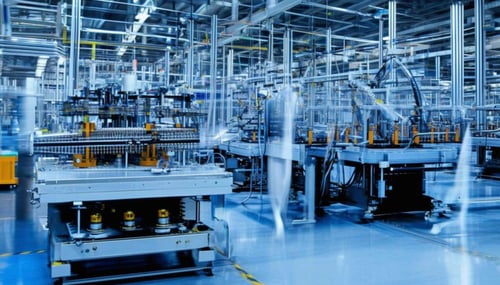Unlocking Agility with Flexible Manufacturing Systems: The Role of Advanced IT Integration
Market demands are shifting rapidly, customization is becoming the norm, and supply chain disruptions are forcing manufacturers to rethink their production strategies. Enter Flexible Manufacturing Systems (FMS)—an approach that combines automation, intelligent scheduling, and integrated IT systems to maximize responsiveness and efficiency.
For a Manufacturing IT Manager, deploying an FMS is not just about upgrading equipment; it’s about orchestrating seamless system integration to enable real-time decision-making. This is where advanced scheduling and optimization tools like PlanetTogether, in tandem with enterprise systems such as SAP, Oracle, Microsoft, Kinaxis, and Aveva, play a crucial role.

What is a Flexible Manufacturing System (FMS)?
An FMS is a highly automated manufacturing system that is capable of quickly adapting to changes in production volume and product design without major reconfiguration. It integrates:
Automated machinery (e.g., CNC machines, robotics, and AGVs)
Smart scheduling and dispatching
Interconnected IT systems (ERP, MES, APS)
Real-time data analytics and monitoring
The goal of an FMS is to minimize downtime, reduce costs, and optimize resource utilization, allowing manufacturers to efficiently manage high product variety with minimal manual intervention.
The IT Challenge: Integration and Real-Time Visibility
For IT teams, the success of an FMS depends on seamless system integration. Industrial manufacturers typically rely on ERP (SAP, Oracle, Microsoft), MES (Aveva), and APS (PlanetTogether) to coordinate production workflows. However, without real-time data exchange between these systems, bottlenecks and inefficiencies can arise.
Key IT challenges in FMS implementation include:
Data Silos: Disconnected systems hinder real-time decision-making.
Lack of Visibility: Without a unified dashboard, tracking machine utilization, material flow, and scheduling conflicts is difficult.
Scalability Issues: As production complexity increases, legacy IT systems struggle to keep up.
Security Risks: More interconnectivity means greater exposure to cyber threats.

Enhancing FMS with PlanetTogether APS Integration
An Advanced Planning and Scheduling (APS) system like PlanetTogether bridges the gap between ERP, MES, and shop-floor automation, ensuring synchronized operations. When integrated with SAP, Oracle, Microsoft, Kinaxis, or Aveva, PlanetTogether enhances FMS efficiency in the following ways:
Dynamic Scheduling and Real-Time Adjustments
Traditional scheduling methods struggle with variability in production. PlanetTogether’s AI-driven scheduling engine dynamically adjusts production plans in real time based on machine availability, material supply, and customer orders.
✅ SAP + PlanetTogether: SAP’s ERP manages high-level production planning, while PlanetTogether ensures real-time execution by automatically adjusting schedules based on shop-floor feedback.
✅ Oracle + PlanetTogether: Oracle SCM integrates with PlanetTogether to streamline production sequences, reducing changeover times and improving on-time delivery.
Optimized Resource Allocation
Manufacturers often deal with limited machine availability, fluctuating workforce capacity, and supply chain constraints. PlanetTogether, integrated with Kinaxis, leverages predictive analytics to recommend the best production paths, ensuring optimal resource utilization.
✅ Kinaxis + PlanetTogether: Kinaxis provides end-to-end supply chain visibility, while PlanetTogether aligns production schedules with demand forecasts, preventing overproduction or underutilization.
Seamless Data Exchange Between IT Systems
A key challenge in manufacturing IT is ensuring smooth data flow between MES (Aveva), ERP, and APS. PlanetTogether acts as an intelligent middleware, enabling:
✅ Aveva + PlanetTogether: Aveva MES captures real-time production data, which is then fed into PlanetTogether’s scheduling engine for immediate adjustments, minimizing production delays.
✅ Microsoft Dynamics 365 + PlanetTogether: Microsoft’s ERP ecosystem synchronizes financial, inventory, and production data with PlanetTogether, ensuring accurate material planning and order fulfillment.
Reducing Lead Times & Improving On-Time Delivery
By integrating an APS like PlanetTogether with SAP or Oracle, manufacturers can drastically cut lead times through intelligent job sequencing, reducing bottlenecks and maximizing throughput.
✅ Example: A manufacturer using SAP ERP and PlanetTogether reduced lead times by 30% by eliminating redundant machine setups and optimizing scheduling sequences.
For industrial manufacturers, embracing Flexible Manufacturing Systems is a game-changer, but its success hinges on robust IT integration. By leveraging PlanetTogether’s APS alongside SAP, Oracle, Microsoft, Kinaxis, or Aveva, IT managers can transform production into an agile, data-driven ecosystem.
✅ Real-time scheduling and adjustments ✅ Optimized resource allocation ✅ Seamless data flow across IT systems ✅ Reduced lead times and improved delivery performance
In a world where agility is king, manufacturers that invest in integrated FMS solutions will stay ahead of the curve, reducing costs, improving efficiency, and delivering unmatched customer value.
Are you ready to take your manufacturing operations to the next level? Contact us today to explore how seamless IT integration can revolutionize your production efficiency and learn more about how PlanetTogether can help you achieve your goals and drive success in your industry.
Topics: Industrial Manufacturing, PlanetTogether Software, Integrating PlanetTogether, Optimized Resource Allocation, Reducing Lead Times, Improving on-time delivery performance., Dynamic Scheduling and Real-Time Adjustments





















LEAVE A COMMENT